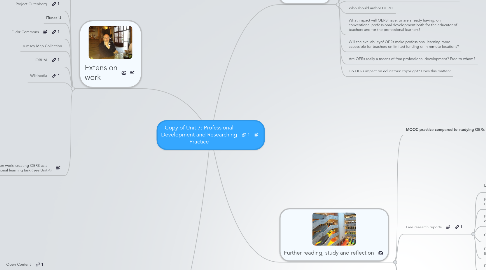
1. Informal professional development OERs
1.1. Open Content
1.2. OKOER
1.3. MOOC
1.3.1. xMOOCs
1.3.2. CMOOC
1.3.3. What is a MOOC?
1.4. Webinars
1.5. Learning from Woerk
1.6. MirandaMods
2. Stimulus questions
2.1. Are all kinds of pedagogical styles that underpin OERs acceptable?
2.2. Should OERs promote commercial content?
2.3. What is the value in terms of professional learning of OERS compared with MOOCs
2.4. Might OERs bring about the death of the university accredited educator and the demise of educational publishers?
2.5. Are OERs a panacea for professionallearning at no cost?
2.6. Are all recommendations to educators use particular OERs for professional development equally trust worthy? When might the recommendations be questionable?
2.7. Who should author OERs?
2.8. What impact will OERS have, or are already having, on conventional professional development both for the educator of teachers and for the professional learners?
2.9. Will the availabilityof OERs make professional learning more accessible for teachers on limited funding or in remote locations?
2.10. Are OERs really a means of free professional development? Free to whom?
2.11. Do OERs impact on educators' copyright? Does this matter?
3. Extension work
3.1. Academic Institutions
3.1.1. Open Learn
3.1.2. University of Oxford
3.2. Wiki Foundation
3.2.1. Wikipedia
3.2.2. WikiMedia Commons
3.3. Internet Archive
3.3.1. Prelinger
3.4. Wellcome Foundation
3.5. National Archives
3.6. Khan
3.6.1. Smart History
3.6.2. Khan Academy
3.6.3. Computer Science
3.7. Project Gutenberg
3.8. iTunes U
3.9. Flickr Commons
3.10. rumsey Map Collection
3.11. JORUM
3.12. Wikipedia
3.13. Extension work: creating OERS as a professional learning task ( see Unit 4)
3.13.1. Licences
3.13.1.1. Creative Commons
3.13.1.1.1. Licences
3.13.1.1.2. Categories
3.13.1.1.3. Jurisdiction
3.13.1.1.4. CC Reosurces
3.13.1.1.5. CC Tools
3.13.1.2. Public Domain
3.13.1.3. © Copyright
3.13.2. Media
3.13.2.1. Text
3.13.2.1.1. eBooks
3.13.2.2. images
3.13.2.3. Video
3.13.2.4. Web Based
3.13.2.4.1. Blogs
3.13.2.4.2. Platfroms
3.13.3. Application
3.13.3.1. MOOCs: Two pedagogical styles:creation, creativity, autonomy, and social networked learning or traditional transmission approach through video presentations and short quizzes and testing.
3.13.3.1.1. Examples:a reading MOOC
3.13.3.1.2. The new VLE?
3.13.3.2. Online Course
3.13.3.2.1. Local Courses
3.13.3.2.2. MOOCs
3.13.3.3. VLEs
3.13.3.3.1. use of OERs in VLES
3.13.3.4. Crowd sourcing
3.13.3.4.1. microblogging e.g. Twitter
3.13.3.4.2. informal information e.g. Linkedin
3.13.3.5. MirandaMods
3.13.3.6. TeachMeets
3.13.3.7. OER development comunity
3.13.3.8. OER Use - Practical Examples
3.13.3.8.1. Redwood College
3.13.4. Properties
3.13.4.1. Sustainability
3.13.4.2. Open Learning
3.13.4.3. Knowledge Building
3.13.4.4. Transferability
3.13.4.5. Open Content
3.13.4.6. Shareable
3.13.4.7. Open Acess
3.13.4.8. Standards
3.13.5. E-tools for researching OERs
3.13.5.1. Researching Practice
3.13.5.1.1. Apples, screwdrivers and desks: a comparative review of three Stanford free courses"
3.13.5.1.2. Sitting in a bar with a really smart friend
3.13.5.2. Collaboration
3.13.5.2.1. e-tools for working online collaboratively
3.13.5.3. Management
3.13.5.3.1. Module review
3.13.5.3.2. Reflecting
3.13.5.3.3. Transforming practice
4. Further reading, study and reflection
4.1. MOOC practice compared to studying OERs
4.1.1. Four Barriers to MOOCs
4.1.2. MOOCs: Advantages and disadvantages
4.1.3. MOOC participant views
4.1.4. MOOC Backlash
4.1.5. MOOC: Poor learning design
4.1.6. Learning for Free? MOOCs
4.2. Free research reports
4.2.1. Leask, M. and C. Preston (2011) ICT Tools for Future Teachers: Becta, Coventry.
4.2.2. Pachler, N, C. Preston, J. Cuthell, A. Allen and Pinheiro Torres (2011) The ICT CPD Landscape in England, Becta
4.2.3. Preston, C. (2004). Learning to use ICT in Classrooms: teachers’ and trainers’ perspectives: an evaluation of the English NOF ICT teacher training programme (1999-2003)
4.2.4. Cuthell J.P. (2012) Learning in Liminality (2012)
4.2.5. Daly, C., Pachler, N. and Pelletier, C. (2009) ICT CPD for school teachers: a literature review for Becta. London: WLE Centre.
4.2.5.1. New node
4.2.6. Daly, C., Pachler, N. and Pelletier, C. (2009b) ICT CPD for school teachers: a research report. Becta. London: WLE Centre.
4.3. How we learn: TED talks
4.4. Links to other relevant units
4.4.1. Unit 4: Curriculum Specific Resources
4.4.2. Unit 6: e-Tools for Teaching and Learning
4.4.3. Unit 9: Online Community Working
